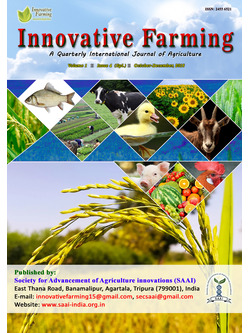
Riverbed Farming
Himani B. Patel*
Dept. of Vegetable Science, ASPEE College of Horticulture & Forestry, Navsari Agricultural University, Navsari - 396 450, Gujarat, India
S.N. Saravaiya
Dept. of Vegetable Science, ASPEE College of Horticulture & Forestry, Navsari Agricultural University, Navsari - 396 450, Gujarat, India
Sanjeev Kumar
Dept. of Vegetable Science, ASPEE College of Horticulture & Forestry, Navsari Agricultural University, Navsari - 396 450, Gujarat, India
A.I. Patel
Dept. of Vegetable Science, ASPEE College of Horticulture & Forestry, Navsari Agricultural University, Navsari - 396 450, Gujarat, India
DOI: NIL
Keywords: Cucurbits, Diara cultivation, Riverbed farming
Abstract
Seasonally, dry riverbeds are an under-utilized resource that can be used for sustainable vegetable production. In many countries, cucurbitaceous vegetables are extensively being grown in riverbeds (called diara land). Riverbed cultivation or diara cultivation is a very old practice of growing vegetables on the bank or basin of rivers after the flood level recedes. These diara lands are formed and subjected to alluvion and diluvion action of perennial Himalayan rivers and due to inundation caused by swollen rivers during South-West monsoon. This system is unconnected with any other crop rotation and cucurbits are specially adapted to this system of growing due to their long tap root system. It can be treated as a kind of vegetable forcing wherein the cucurbits are grown under sub-normal conditions, literally on sand, during winter months from November–February, especially in North and North-Western India. Riverbed farming can be used to increase household income and to improve the food security of landless and land-poor households of India.
Downloads
not found
